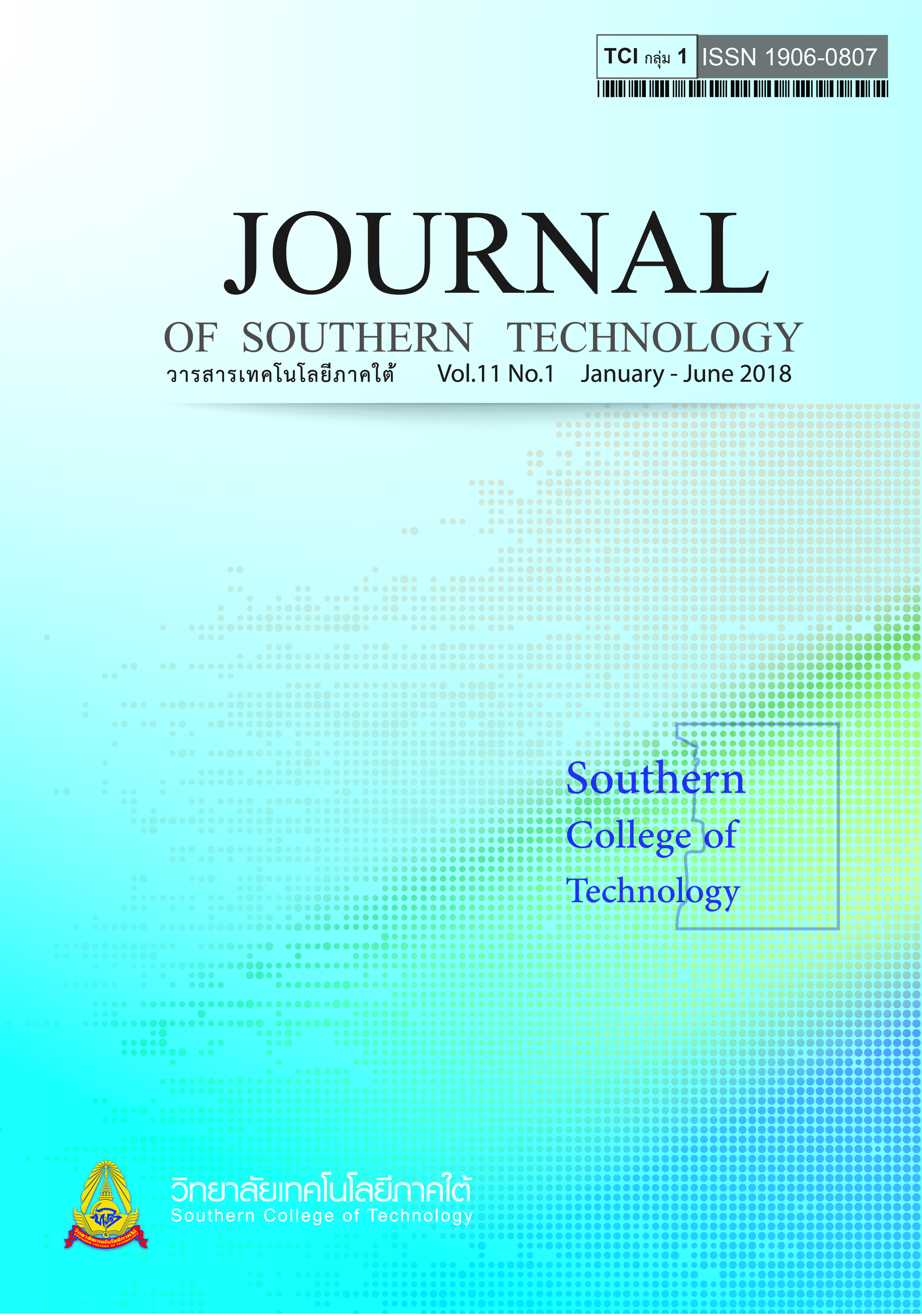กลยุทธ์ในการเรียนภาษาของนักศึกษาที่มีประสิทธิภาพในการเรียนภาษาสูงและต่ำ ในมหาวิทยาลัยของไทย
Main Article Content
บทคัดย่อ
กลยุทธ์ในการเรียนภาษาเป็นปัจจัยสำคัญที่ช่วยให้ผู้เรียนภาษาต่างประเทศประสบความสำเร็จในการเรียน งานวิจัยในหลายประเทศจึงถูกออกแบบมาเพื่อศึกษาว่าผู้เรียนมีกลยุทธ์การเรียนภาษาอย่างไร งานวิจัยแบบผสมผสาน นี้จัดทำขึ้นเพื่อศึกษากลยุทธ์ในการเรียนภาษาของนักศึกษาที่มีประสิทธิภาพในการเรียนภาษาสูงและต่ำในมหาวิทยาลัยของไทย และศึกษาว่านักศึกษาทั้งสองกลุ่มมีการใช้กลยุทธ์ในการเรียนภาษาต่างหรือเหมือนกันอย่างไร เครื่องมือที่ใช้ในการเก็บข้อมูลในครั้งนี้ คือ แบบสอบถามของ Oxford’s Strategy Inventory for Language Learning (SILL) เพื่อใช้ถามเกี่ยวกับการเลือกใช้กลยุทธ์การเรียนภาษาของนักศึกษาซึ่งเป็นนักศึกษาสาขาวิชาภาษาอังกฤษเพื่อการสื่อสาร มหาวิทยาลัยมาสเตอร์ (นามสมมติ) จากจำนวนนักศึกษาที่ทำแบบสอบถามทั้งหมด มีนักศึกษา จำนวน 17 คน สมัครใจให้สัมภาษณ์
ผลการวิจัยพบว่า นักศึกษาที่มีประสิทธิภาพในการเรียนภาษาสูงใช้กลยุทธ์ด้านอภิปัญญามากที่สุด นักศึกษาที่มีประสิทธิภาพในการเรียนภาษาต่ำใช้กลยุทธ์ด้านอภิปัญญาเป็นบางครั้ง นอกจากนี้งานวิจัยยังพบอีกว่านักศึกษาทั้งสองกลุ่มเลือกใช้กลยุทธ์ด้านพุทธิปัญญาน้อยที่สุด ผลการวิจัยในภาพรวม พบว่า นักศึกษาที่มีประสิทธิภาพในการเรียนภาษาสูงมีการใช้กลยุทธ์การเรียนภาษาบ่อยกว่านักศึกษาที่มีประสิทธิภาพในการเรียนภาษาต่ำ งานวิจัยนี้ยังชี้ให้เห็นความสำคัญของกลยุทธ์การเรียนภาษาซึ่งเป็นประโยชน์ในการปรับปรุงการเรียนการสอนภาษา อันเป็นสิ่งสำคัญในการเลือกใช้กลยุทธ์ในการเรียนของผู้เรียน และการเลือกใช้วิธีการสอนของอาจารย์
Article Details
- ผู้เขียนต้องยินยอมปฏิบัติตามเงื่อนไขที่กองบรรณาธิการวารสารกำหนด และผู้เขียนต้องยินยอมให้บรรณาธิการ แก้ไขความสมบูรณ์ของบทความได้ในขั้นตอนสุดท้ายก่อนเผยแพร่
- ลิขสิทธิ์บทความเป็นของผู้เขียน แต่วารสารเทคโนโลยีภาคใต้คงไว้ซึ่งสิทธิ์ในการตีพิมพ์ครั้งแรก โดยเหตุที่บทความนี้ปรากฏในวารสารที่เข้าถึงได้จึงอนุญาตให้นำบทความไปใช้เพื่อประโยชน์ทางการศึกษา แต่มิใช่เพื่อการพาณิชย์
เอกสารอ้างอิง
Berger, K., & Volkle, M. (2013). Classification theories of foreign language learning strategies: an exploratory analysis. Studia Paedagogica, 18(4), 94-113.
Caracelli, V. W., & Greene, J. C. (1993). Data analysis strategies for mixed-method evaluation designs. Educational Evaluation and Policy Analysis, 15, 195-207.
Castilllo, M., & Cordora, K. (2014). Language learning strategies and academic success: a Mexican perspective. Universities Psychological, 13(2), 706-713.
Creswell, J. W. (2006). Understanding mixed methods research. In Creswell, J.W. & Plano-Clark, V. (Eds.), Designing and Conducting Mixed Methods Research (pp1-19). Thousand Oaks: Sage Publications, Inc.
Dreyer, C., & Oxford, R. (1996). Learning strategies and other predictors of ESL proficiency among Afrikaans-speakers in South Africa. In R. Oxford (Ed.), Language Learning Strategies Around the World: Cross-cultural Perspectives (pp. 61-74). Manoa: University of Hawaii Press.
Gerami, M., & Baighlou, S. (2011). Language learning strategies used by successful and unsuccessful Iranian EFL students. Procedia-Social and Behavioral Sciences, 29, 1567-1576.
Jacob, E. (1987). Traditional of qualitative research: A review. Review of Educational Research, 57, 1-50.
Judge, J. (2012). Use of language learning strategies by Spanish adults for business English. International Journal of English Studies, 12(1), 37-54.
Kiram, J., Sulaiman, J., Swanto, S., & Din, W. (2014). The relationship between English language learning strategies and gender among pre-university students: An overview of UMS. Proceeding of the 21st National Symposium on Mathematical Science, 775-780.
Mochizuki, A. (2016). Language learning strategies used by Japanese university students. RELC Journal, 30(2), 101-113.
Oxford, R. (2003). Language Learning Styles and STRATEGIES: an Overview. GACA.
Oxford, R. L. (1990). Language Learning Strategies. Boston, Massachusetts: Heinle and Heinle Publishers.
Razak, N., Ismail, F., Aziz, A., & Babikkoi, M. (2012).Assessing the use of English language learning strategies among secondary school students in Malaysia. Procedia-Social and Behavioral Sciences, 66, 240- 246.
Setiyadi, B., Sukirlan, M., & Mahpul, M. (2016). How successful learners employ learning strategies in an EFL setting in the Indonesian context. English Language Teaching, 9(8), 28-38.
Strauss, A., & Corbin, J. (1990). Basics of Qualitative Research: Grounded Theory Procedures and Techniques. Sage Publications, Inc.
Tashakkori, A., & Teddlie, C. (1998). Mixed methodology: Combining qualitative and quantitative approaches. Applied Social Research Methods Series (Vol. 46). Thousand Oaks, CA: Sage.
Zhang, L., & Seepho, S. (2013). Metacognitive strategy use and academic reading achievement: Insights from a Chinese context. Electronic Journal of Foreign Language Teaching, 10(1), 54-69.

